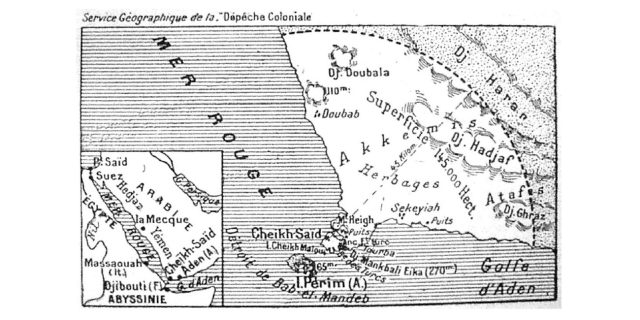
By
Bruce Strang
September 2024
Print Version
What you need to know
The independent Kingdom of Yemen sought to defend Sheīkh Saīd, a promontory that overlooked the strategically vital Bab al-Mandeb Strait. In the late 1930s, Imam Yahya, the temporal and spiritual ruler of Yemen, sought arms from the European Great Powers to defend Yemen and enable it to seize ancestral Yemeni territory. He feared European interference in Yemeni internal affairs and worried that the Great Powers might attack Sheīkh Saīd to further their imperialist aims.
Why this research is important
This study shows the complex interplay between Yemen, a poorly developed feudal country, and the British and Italian Empires. It explains the perils of European economic investment for developing nations and the difficulties they faced in modernizing while maintaining their independence. It also shows the changing relationship between Britain and Fascist Italy as Mussolini sought to challenge British influence in the Arabian Peninsula.
How this research was conducted
Research in archives such as the Archivio Storico Diplomatico del Ministero degli Affari Esteri and the Archivio Centrale dello Stato in Rome and the National Archives of the United Kingdom provided the research evidence.
What the researcher found
Imam Yahya, the Zeidi spiritual leader and ruler of Yemen, gradually established control over the historic core of the Yemeni highlands and the coastal plan on the east bank of the Red Sea during the 1920s. Yemen controlled the promontory of Sheīkh Saīd that overlooked the British-held island of Perim and the strategically important Bab al-Mandeb Strait. Fascist Italy recognized Yemeni independence through a 1926 Treaty of Commerce and Friendship. Italian officials hoped to establish a client state relationship with Yemen. Imam Yahya, however, was fiercely independent and resisted foreign attempts to control Yemen. British officials resented the development of Italian economic ties and influence in Yemen, but neither power wanted peripheral interests in Arabia to damage their friendly relations as arbiters of Locarno-era Europe. In 1927, Britain and Italy reached the Rome Understanding, an agreement to respect the territorial integrity of Yemen and Saudi Arabia and to limit potential imperial competition in Arabia. This agreement held until reconfirmed in the 1938 Anglo-Italian Easter Accords. After Italy’s conquest of Ethiopia, however, Imam Yahya had become concerned about a potential Great Power attack on Sheīkh Saīd. He asked the Italian government to sell him large naval cannon to defend Sheīkh Saīd against seaborne invasion. Italian officials dissuaded Yahya. Large naval cannon would be too expensive, difficult for Yemeni troops to operate, and, most importantly, could block Italian ships from traversing the southern exit of the Red Sea should Sheīkh Saīd fall into enemy hands. After Italy occupied Albania in 1939, Yahya turned to ask Britain to supply naval cannon and gas masks for the defence of Sheīkh Saīd against an Italian attack. Extensive British discussions led to a dead end. Other strategic priorities, British law, and the acute shortages for its own rearmament meant that Britain could do little to support Imam Yahya. Eventually, the Italian government relented and sold cannon for the defence of Sheīkh Saīd. The episode shows the nature of Italian and British cooperation and conflict in the Arabian Peninsula. Their relationship deteriorated after Italy’s invasion of Ethiopia, and British and Italian planners came to view their counterparts as potential enemies as they strategized over wartime control of the strategically vital sea lane through the Suez Canal and the Red Sea.
How this research can be used
This episode shows the flexible nature of Italian imperialism in the 1930s as it sought to develop economic and political influence in Yemen. It explains the comparative difficulty for British strategists to counter Italian influence in Yemen, given the territorial demands that Imam Yahya maintained against Britain’s Aden Protectorate. It also demonstrates the difficulty for Imam Yahya as he sought to play the two imperial competitors against one another while maintaining control over his kingdom and resisting imperial influence.
Acknowledgements
The author thanks the Social Sciences and Humanities Research Council of Canada and the Brandon University Research Committee for funding the research for this article.
About the Researcher
Keywords
- arms sales
- Great Britain
- imperialism
- Itlay
- Yemen
Publications Based on the Research
Strang, B, G. (in press). Arming Sheīkh Saīd: Conflict and cooperation in Italian and British imperial policy in the Arabian Peninsula and the Red Sea, 1927-1940. Diplomacy & Statecraft.
Editor: Christiane Ramsey
Read more BU Research
Research at Brandon University follows comprehensive policies designed to safeguard ethics, to ensure academic integrity, to protect human and animal welfare and to prevent conflicts of interest.

